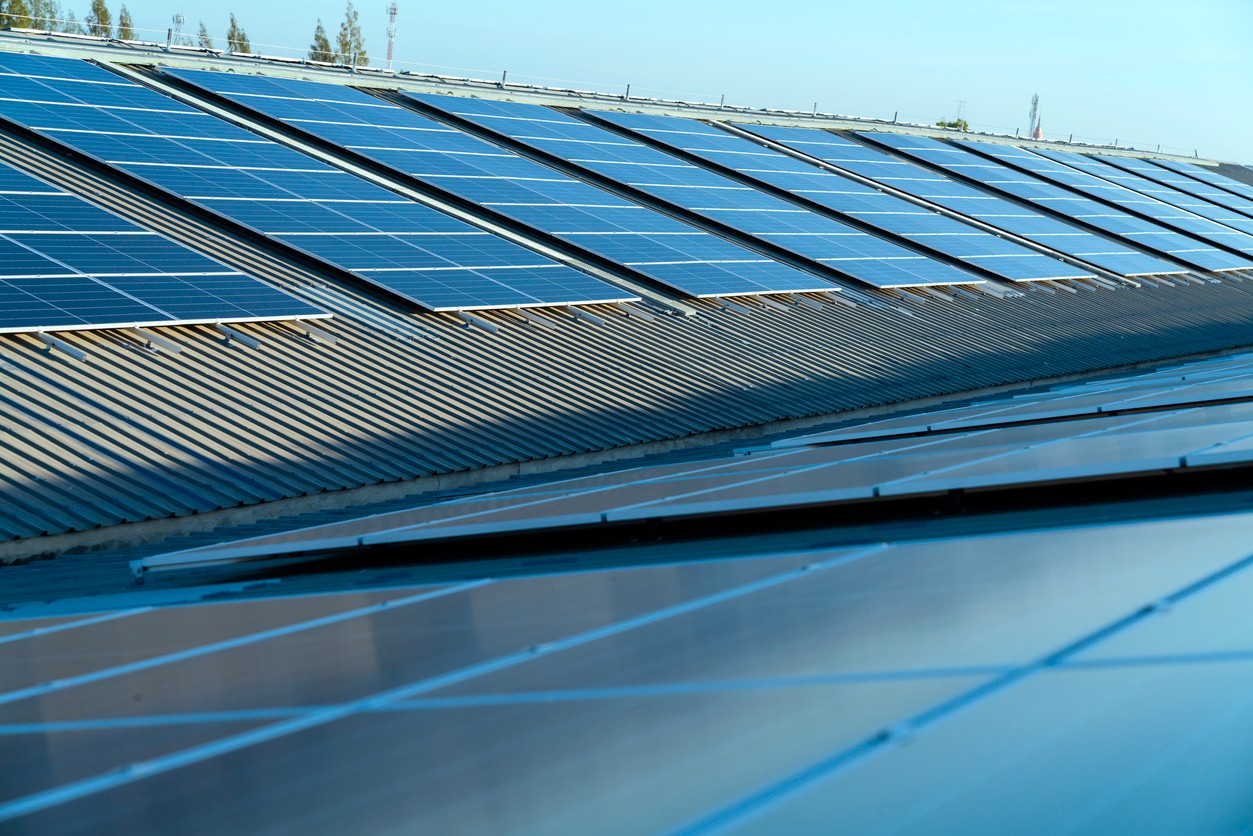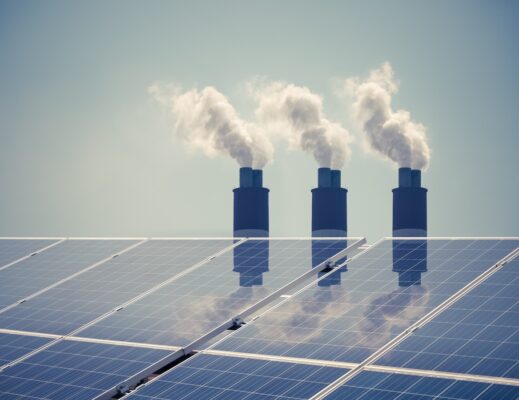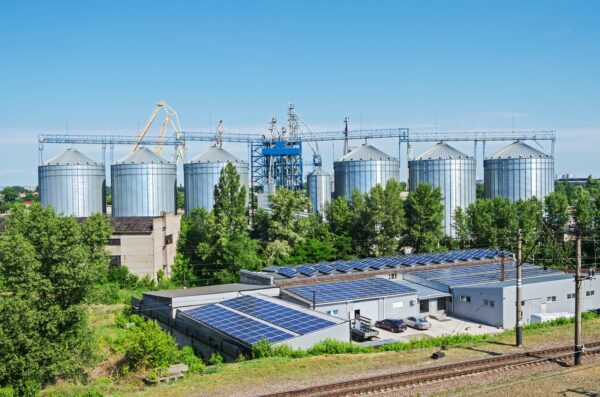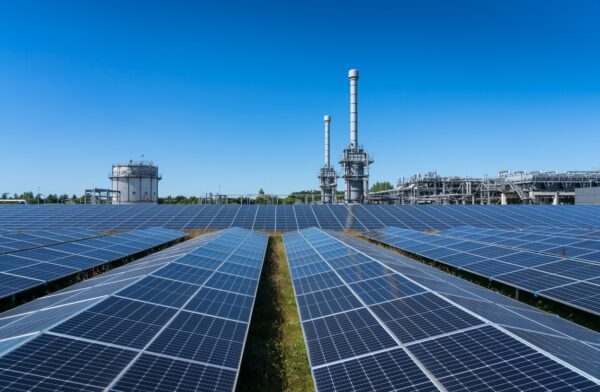
Over the years, the commercial solar system has become integral to business operations, including large industries. Increasing accessibility and affordability are among the most potential advantages an industrial solar power system can offer. As the installation and purchase costs continue to drop, industries can benefit from lease-to-buy options and reduce their conventional utility bills.
Here are a few benefits industrial enterprises might receive from installing solar PV.
Commercial Solar Power for Industrial Processes

The latest Energy Information Administration report shows that the Industrial sector used 32 percent of the total energy consumption of the U.S. and 35% of all end-use energy consumption in 2019. The U.S. Department of Energy Solar Energy Technology Office seeks to establish a carbon-free energy sector by 2050 and progress solar technology and products for the industrial sector to help accomplish the goals.
Solar Power Benefits for Industrial Sector
1. Decreased Energy Bills
Did you know that an average energy bill or expense for a warehouse is 15 to 16 percent of the total operational cost?
The percentage constantly increases when an industry or factory relies on conventional energy sources to produce electricity. However, the industrial sector can overcome the rising cost of energy bills by switching to commercial solar power, as its tariff rates are significantly cost-effective compared to traditional electricity.
With a substantial energy cost reduction, it has become one of the accessible energy alternatives for companies and industries with a fixed-cost solution.
Transitioning to solar power can make the electricity cost more predictable for industries. Also, monitoring and maintaining a commercial solar system is easier and cheaper for industrial plants. If the electricity use of your industry is high, commercial solar interconnection is a great substitute or energy source to power lights, operations, and equipment.
2. Clean, Renewable Energy
This is one of the most crucial benefits the entire industrial industry can obtain from the commercial solar system. Unlike conventional energy, solar system generates power that is 100 percent renewable, clean, and safe for the environment. It can reduce the industry’s dependence on fossil fuels such as coal, natural gas, and oil for electricity generation.
These fossil fuels cause global warming by emitting harmful emissions that degrade the air, water, and soil quality. Experts predict that Earth is likely to lose more plant and animal species to extinction by 2060 than in the preceding 65 million years if it keeps using fossil fuels for energy production.
Solar energy, in contrast, doesn’t cause any pollution. It is a limitless energy source that doesn’t damage the ozone layer, which is the sun’s enormous power. The industrial solar energy system is an investment in the planet’s future that can support preserving non-renewable energy sources and environmental protection.
3. Increased Industrial Energy-Efficiency
Commercial solar installations on the roofs of factories increase industrial energy efficiency.
When a factory has a commercial solar power system, the energy required by the building can be generated by solar panels, resulting in cheaper short and long-term running costs than equivalent buildings without solar panels.
4. Government Support
There are federal and state tax incentives given to industries that install solar panels for commercial use. The purpose is to get businesses to switch to solar energy. Local government agencies are encouraging enterprises that use renewable energy sources to support a sustainable urban economy.
Despite the growing support for the green economy from experts around the globe, there is still a significant dependency on fossil fuels. Local governments are becoming more and more important players in the development and application of climate-friendly policies.
5. Reduced CO2 Emission
As mentioned above, reducing CO2 and fossil fuel consumption is becoming more relevant every day. Commercial solar panels produce energy with zero carbon emission which is a leading cause of air pollution. The energy generation process is ideal for the industrial sector with no waste or ash products.
More businesses and consumers prefer products manufactured in the industry powered by commercial solar power. It demonstrates the commitment of the industry toward its social responsibility.
6. Manageable Maintenance Cost
In general, commercial solar energy systems only need a little upkeep. They require a minimal amount of cleaning. The majority of trustworthy solar panel manufacturers provide 20–25 year warranties.
There is no wear and tear because the system doesn’t have moving parts. It constantly converts solar energy into power and heat; the inverter is typically the sole component that needs to be replaced after 5 to 10 years.
To guarantee that the solar power system operates as efficiently as possible, sufficient maintenance is required for the cables in addition to the inverter. As a result, you may have to spend very little on maintenance or upkeep and repairs after installing the solar system
7. Easy-to-track ROI
The APP allows users to keep tabs on their solar panel installation. Typically, the APP allows PV installers and providers to examine the most recent data and conduct remote monitoring using their mobile devices whenever and wherever they are. Thus, it becomes easier to monitor return on investment and profits.
8. Reduced Disruption
Industries need an uninterrupted supply of electricity to keep their operations running. The commercial solar power system is independent of the changing weather. It is a stable and easily distributed energy source compared to fossil fuels for the industrial industry.
With renewable energy from commercial solar power, industries won’t face service interruption. And that is what makes it possible for the companies to operate continuously. This can make a huge impact if your rivals are struggling.
9. Self-Consumption Electricity Generation
Self-consumption of electricity by commercial solar power for industries refers to using solar panels to generate electricity for on-site consumption instead of purchasing it from the grid. This can lead to energy independence for the industrial sector.
Solar panels are installed on the roof or the ground, and the generated power is used directly by the industrial processes, reducing the demand from the grid and the amount of energy that needs to be purchased. This approach is becoming increasingly popular among industrial facilities looking to reduce energy costs and support sustainable energy practices.
10. Elevated Image of Industry
Finding fresh approaches to draw clients and customers can be difficult, particularly when you lose inspiration. However, moving to renewable energy can enable you to position your industry as environmentally friendly because more and more consumers want to make informed purchase decisions.
The younger generations are especially keen to support environmentally friendly and sustainable businesses. Green energy plans can meet their ideology and perspective towards better living as they age, as they make up a larger proportion of the buying public.
That is to say, going green can be a terrific way to increase your company’s public image, and it might make a huge difference between customers choosing you over a rival.
11. Forward Thinking Approach
Switching to the commercial solar system while it’s gaining popularity can help your industry stand out as a forward-thinking, creative enterprise. Your consumers will keep you in mind as one of the pioneers when other companies start to make a move themselves and continue to turn to you for trend ideas.
Primary Industries Benefiting From Solar Energy

The top industrial sector can save on energy costs and protect themselves from the potential impact of increasing electricity prices by installing a solar panel system. There are a few industrial sectors that solar energy can particularly help.
Agriculture
Agricultural operations like dairy and poultry farms use a lot of electricity and have spacious roofs perfect for solar panel installation. For instance, a normal chicken farm needs constant ventilation and temperature control, which are maintained with electric fans of an industrial capacity.
An agricultural enterprise can convert from power provided by the utility company to renewable energy generated on-site if it has a roof-mounted commercial solar system. They will save a lot of money thanks to this change.
Manufacturing Industries
Manufacturing facilities utilize a substantial amount of electricity, making them a perfect candidate for commercial solar panel installation. A manufacturer will save millions of dollars by switching to solar power while protecting itself from rising energy expenses.
According to the Solar Means Business Report, manufacturing accounted for 86 MW of solar PV energy generation. These installations must be substantial to affect the company’s overall energy consumption due to the magnitude of manufacturing operations.
Leverage the Power of Solar Energy with Coldwell Solar
Any company in the industrial sector requires an electricity supply to run its facilities’ essential operations. Therefore, one of the most important factors in lowering the fixed expenses of economic activity is having the optimum energy solution.
Commercial solar panel providers such as Coldwell Solar have been a trusted choice of many industry owners to install, maintain, or replace commercial solar panels. Businesses that opt for Coldwell Solar become energy efficient and produce solar energy at an industrial scale.


